2025年牛津译林版英语中考专题复习课件(共31张PPT) 译林版 八年级(上)Units5-8
文档属性
| 名称 | 2025年牛津译林版英语中考专题复习课件(共31张PPT) 译林版 八年级(上)Units5-8 |  | |
| 格式 | pptx | ||
| 文件大小 | 1.5MB | ||
| 资源类型 | 教案 | ||
| 版本资源 | 牛津译林版 | ||
| 科目 | 英语 | ||
| 更新时间 | 2025-03-10 20:33:08 | ||
图片预览

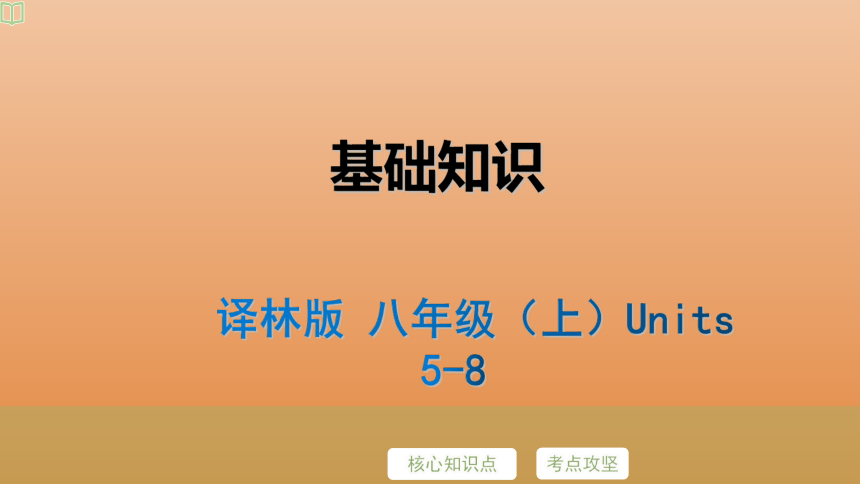

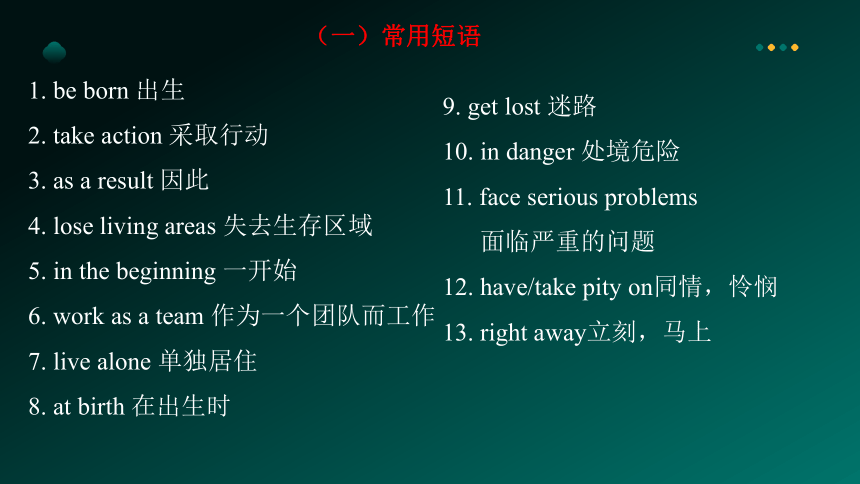
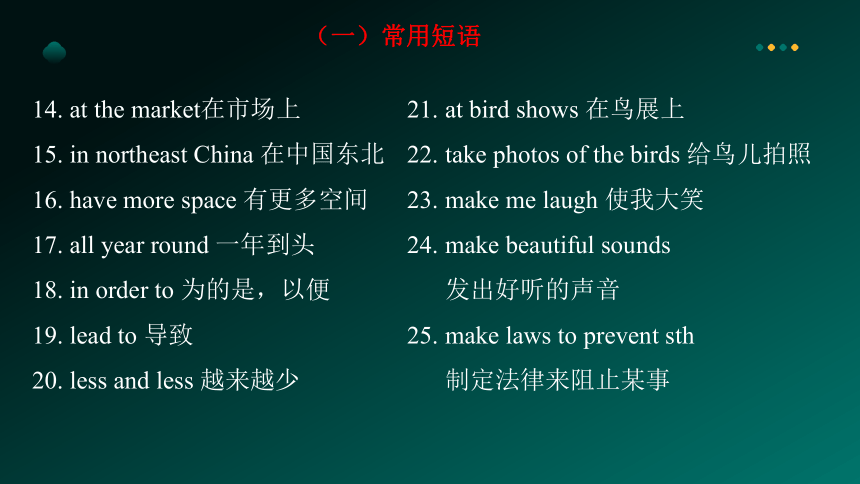
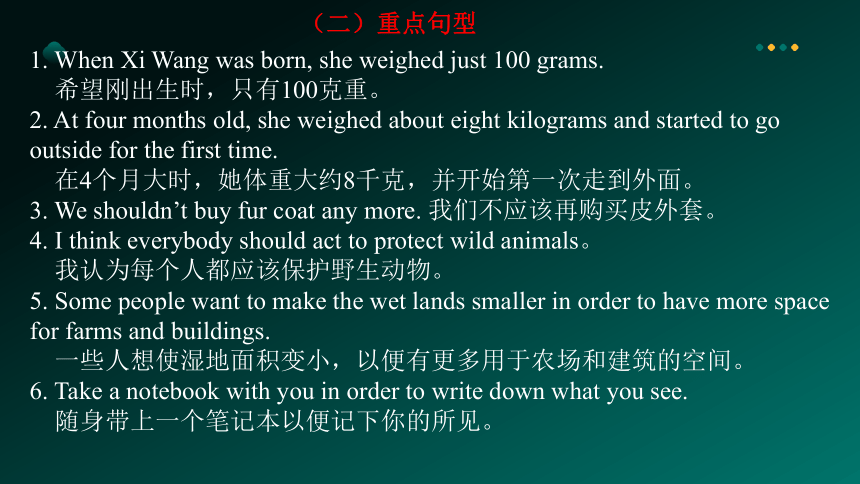
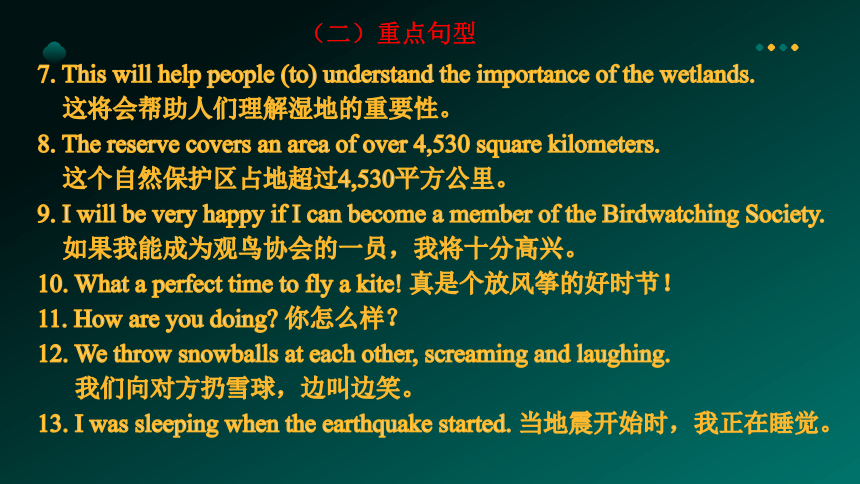
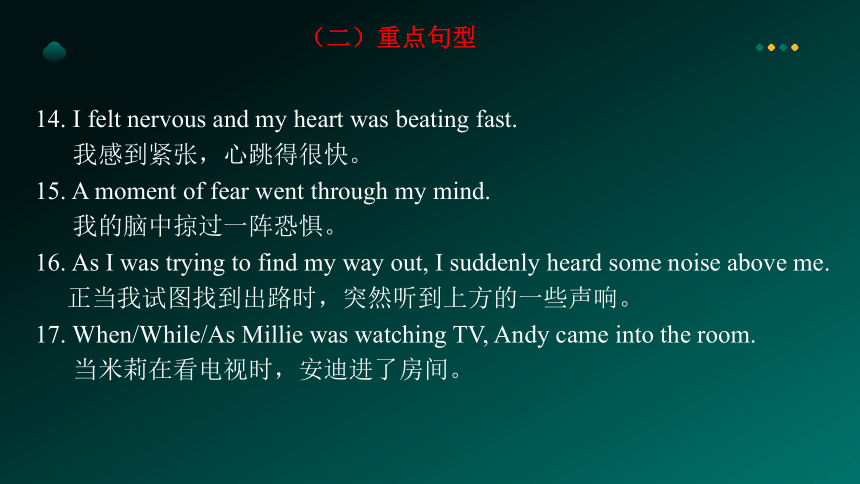

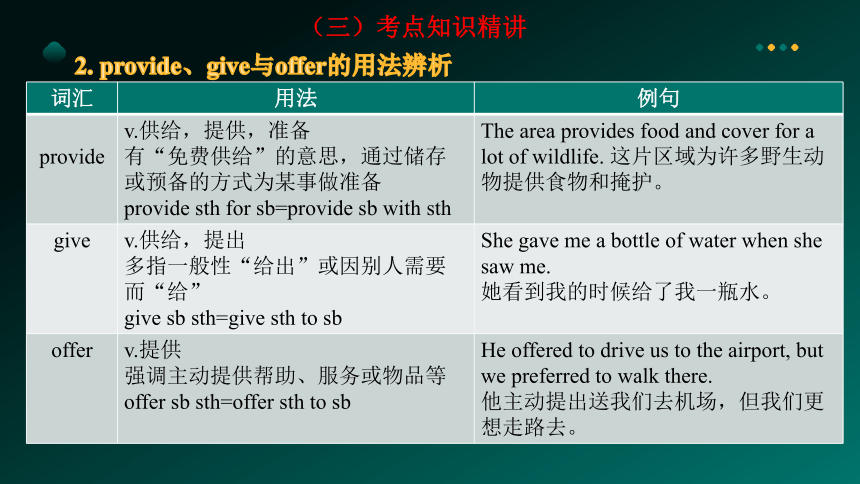
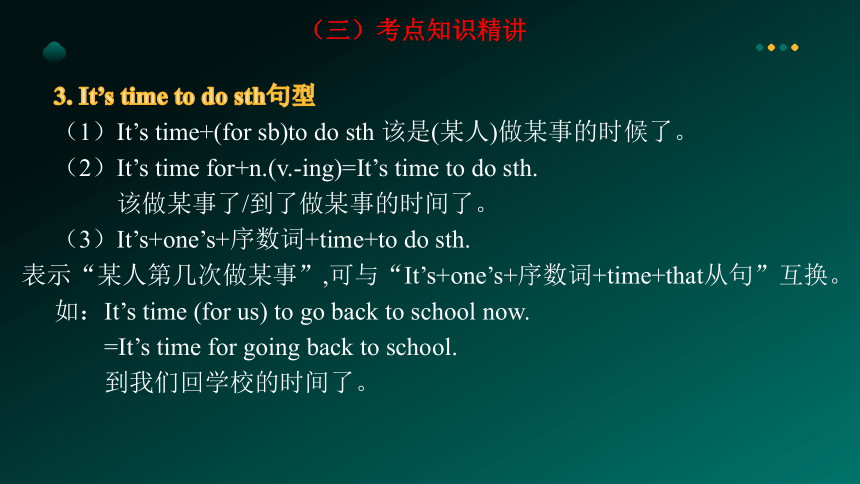
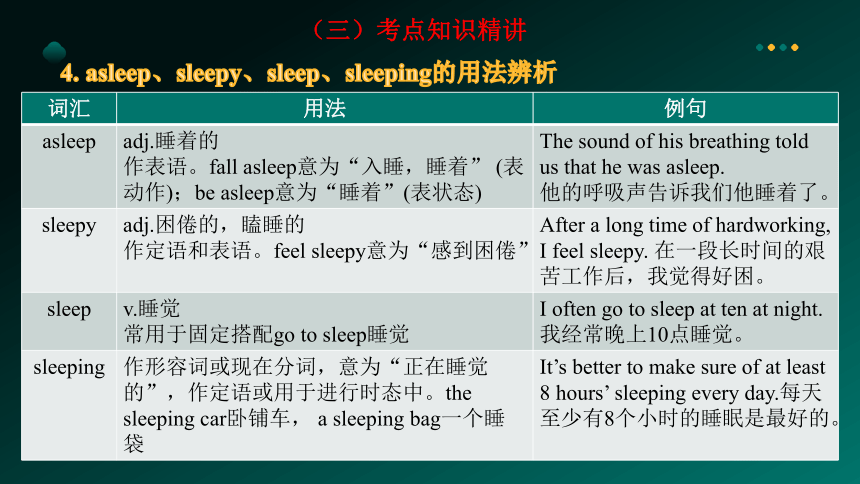
文档简介
(共31张PPT)
2025年英语中考复习
基础知识
译林版 八年级(上)Units 5-8
核心知识点
贰
(一)常用短语
1. be born 出生
2. take action 采取行动
3. as a result 因此
4. lose living areas 失去生存区域
5. in the beginning 一开始
6. work as a team 作为一个团队而工作
7. live alone 单独居住
8. at birth 在出生时
9. get lost 迷路
10. in danger 处境危险
11. face serious problems
面临严重的问题
12. have/take pity on同情,怜悯
13. right away立刻,马上
14. at the market在市场上
15. in northeast China 在中国东北
16. have more space 有更多空间
17. all year round 一年到头
18. in order to 为的是,以便
19. lead to 导致
20. less and less 越来越少
21. at bird shows 在鸟展上
22. take photos of the birds 给鸟儿拍照
23. make me laugh 使我大笑
24. make beautiful sounds
发出好听的声音
25. make laws to prevent sth
制定法律来阻止某事
(一)常用短语
(二)重点句型
1. When Xi Wang was born, she weighed just 100 grams.
希望刚出生时,只有100克重。
2. At four months old, she weighed about eight kilograms and started to go outside for the first time.
在4个月大时,她体重大约8千克,并开始第一次走到外面。
3. We shouldn’t buy fur coat any more. 我们不应该再购买皮外套。
4. I think everybody should act to protect wild animals。
我认为每个人都应该保护野生动物。
5. Some people want to make the wet lands smaller in order to have more space for farms and buildings.
一些人想使湿地面积变小,以便有更多用于农场和建筑的空间。
6. Take a notebook with you in order to write down what you see.
随身带上一个笔记本以便记下你的所见。
(二)重点句型
7. This will help people (to) understand the importance of the wetlands.
这将会帮助人们理解湿地的重要性。
8. The reserve covers an area of over 4,530 square kilometers.
这个自然保护区占地超过4,530平方公里。
9. I will be very happy if I can become a member of the Birdwatching Society.
如果我能成为观鸟协会的一员,我将十分高兴。
10. What a perfect time to fly a kite! 真是个放风筝的好时节!
11. How are you doing 你怎么样?
12. We throw snowballs at each other, screaming and laughing.
我们向对方扔雪球,边叫边笑。
13. I was sleeping when the earthquake started. 当地震开始时,我正在睡觉。
(二)重点句型
14. I felt nervous and my heart was beating fast.
我感到紧张,心跳得很快。
15. A moment of fear went through my mind.
我的脑中掠过一阵恐惧。
16. As I was trying to find my way out, I suddenly heard some noise above me.
正当我试图找到出路时,突然听到上方的一些声响。
17. When/While/As Millie was watching TV, Andy came into the room.
当米莉在看电视时,安迪进了房间。
(三)考点知识精讲
1. sell、sale与buy的用法辨析
词汇 用法 例句
sell v.出售,卖出 (1)sell off 甩卖,出售(通常是降低价格出售) (2)sell out 卖完,售光 (3)sell sth to sb/sell sb sth 把某物卖给某人 (4)也可用作系动词用主动表示被动 1.All the things in the shop sale out.
商店里所有的东西都卖光了。
2.The farmer sells the apples to us.
农夫把苹果卖给我们。
Sale n.卖,销售 (1)for sale 待售 (2)on sale 出售,上市,廉价出售 It is said that a lot of things in the supermarket are on sale.
据说超市里有很多东西在打折。
buy v.买入 (1)buy sth from… 从……买某物 (2)buy sth for sb/buy sb sth 为某人买某物 She bought a red scarf for her mother on Mother’s Day. 母亲节那天,她给她妈妈买了一条红围巾。
(三)考点知识精讲
2. provide、give与offer的用法辨析
词汇 用法 例句
provide v.供给,提供,准备 有“免费供给”的意思,通过储存或预备的方式为某事做准备 provide sth for sb=provide sb with sth The area provides food and cover for a lot of wildlife. 这片区域为许多野生动物提供食物和掩护。
give v.供给,提出 多指一般性“给出”或因别人需要而“给” give sb sth=give sth to sb She gave me a bottle of water when she saw me.
她看到我的时候给了我一瓶水。
offer v.提供 强调主动提供帮助、服务或物品等 offer sb sth=offer sth to sb He offered to drive us to the airport, but we preferred to walk there.
他主动提出送我们去机场,但我们更想走路去。
(三)考点知识精讲
3. It’s time to do sth句型
(1)It’s time+(for sb)to do sth 该是(某人)做某事的时候了。
(2)It’s time for+n.(v.-ing)=It’s time to do sth.
该做某事了/到了做某事的时间了。
(3)It’s+one’s+序数词+time+to do sth.
表示“某人第几次做某事”,可与“It’s+one’s+序数词+time+that从句”互换。
如:It’s time (for us) to go back to school now.
=It’s time for going back to school.
到我们回学校的时间了。
(三)考点知识精讲
4. asleep、sleepy、sleep、sleeping的用法辨析
词汇 用法 例句
asleep adj.睡着的 作表语。fall asleep意为“入睡,睡着” (表动作);be asleep意为“睡着”(表状态) The sound of his breathing told us that he was asleep.
他的呼吸声告诉我们他睡着了。
sleepy adj.困倦的,瞌睡的 作定语和表语。feel sleepy意为“感到困倦” After a long time of hardworking, I feel sleepy. 在一段长时间的艰苦工作后,我觉得好困。
sleep v.睡觉 常用于固定搭配go to sleep睡觉 I often go to sleep at ten at night.
我经常晚上10点睡觉。
sleeping 作形容词或现在分词,意为“正在睡觉的”,作定语或用于进行时态中。the sleeping car卧铺车, a sleeping bag一个睡袋 It’s better to make sure of at least 8 hours’ sleeping every day.每天至少有8个小时的睡眠是最好的。
(三)考点知识精讲
5. alive、lively、live、living的用法辨析
词汇 用法 例句
alive adj.活着,有生气的 作表语或后置定语,多用于指人,也可指物 The dog is alive. 狗还活着
lively adj.生气勃勃的,(色彩)鲜艳的 作表语、宾语补足语、前置定语,既可指人,也可指物。同义词为active He is a lively handsome boy.
他是个活泼英俊的男孩。
live (1)读作/laiv/时为形容词,意为“活着的,有生 命的”,作前置定语,只修饰物,不修饰人。还有 “现场直播的”意思 (2)读作/liv/时为动词,意为“居住” Tom lives in small village.
汤姆住在一 个小村子里。
living (1)adj.活的,健在的 作表语、定语,多用于指物,也可指人。反义词为dead (2)n.生计,生活方式 常见搭配:make a living谋生 He has never seen a living tiger.
他从没见过活老虎。
(三)考点知识精讲
6.die、dead、death、dying的用法辨析
词汇 用法 例句
die v.死,死亡 Flowers will die if they are left without water. 如果没有水,花会枯死的。
dead adj.死的,无生命的 His father has been dead for five years.
他父亲已经去世5年了。
death n.死亡、死 His pet dog’s death made him very sad.
他那只宠物狗的死让他很伤心。
dying die的现在分词,也作形容词,表示“垂死的,枯萎的” The fish is dying. 鱼快死了。
(三)考点知识精讲
7. when、while、as的用法辨析
三者可表示“当……时候”,区别如下:
(1)若主句表示的是一个短暂性动作,从句表示的是一个持续性动作,则三者都可用。
He fell asleep when/while/as he was reading. 他看书时睡着了。
(2)若主、从句表示两个同时进行的持续性动作,且强调主句表示的动作延续到从句所指的整个时间,通常要用 while。
Don’t talk while you’re eating. 吃饭时不要说话。
但是,若主从句表示的两个同时进行的动作含有“一边……一边”之意思,则通常用 as:
She sang as she went along. 她边走边唱。
(3)若从句是一个短暂性动作,主句是一个持续性动作,可用 as或when 但不用 while。
It was raining hard when/as we arrived. 我们到达时正下着大雨。
(三)考点知识精讲
(4)若主从句表示的是两个同时(或几乎同时)发生的短暂性动作,用 as或when。
I thought of it just when/as you opened your mouth.
就在你要说的时候,我也想到了。
(5)若要表示两个正在发展变化的情况,一般用 as,相当于汉语的“随着”。
Things are getting better and better as time goes on.
随着时间的推移,情况越来越好。
(6)表示“每当……的时候”,暗示一种规律性,一般要用 when。
It’s cold when it snows. 下雪时天冷。
(7)若主、从句所表示的动作不是同时发生,而是有先后顺序时,则一般要用when。
I will go home when he comes back. 等他回来时,我就回家去。
(三)考点知识精讲
(8)when 可用作并列连词,表示“这时(突然)”; while 也可以用作并列连词,表示“而,却”(表示对比);as 则没有类似用法。
We were about to start when it began to rain.
我们正要出发,这时开始下雨了。
He likes coffee, while she likes tea. 他喜欢咖啡,而她却喜欢茶。
(9)as 后可直接接一个名词,构成省略句,但 while和when 很少这样用。
As/When a boy, he lived in Japan. 他小时候在日本。
(10)when和while后可接现在分词、介词短语、形容词等构成省略句,但 as 一般不这样用。
When/While reading, he fell asleep. 他看书的时睡着了。
When/While in trouble, ask her for help.
遇到麻烦的时候,你就去找她帮忙。
(三)考点知识精讲
8. 名词加后缀-y变为形容词的规律
(1)名词后一般加y。例如:
wind(风)—windy(有风的)
cloud(云)—cloudy(多云的)
snow(雪)—snowy(多雪的)
luck(运气)—lucky(幸运的)
health(健康)—healthy(健康的)
(2)名词最后一个字母为不发音的e,去e加y。例如:
noise(嘈杂)—noisy(嘈杂的)
(3)以一个辅音字母结尾的重读闭音节,先双写这个辅音字母,再加y。例如:
sun(太阳)—sunny(有阳光的)
(三)考点知识精讲
9. 动词不定式的运用
(1)动词不定式的基本形式是“to+动词原形”。例如:
He want to play football after class. 他想课后去踢足球。
(2)动词不定式在句中常作谓语动词的宾语,这一类谓语动词常见的有:
agree 同意、choose 选择、decide 决定、forget 忘记、hope 希望、learn 学习、like 喜欢、plan 计划、prepare 准备、promise 答应、refuse 拒绝、remember 记得、seem 觉得好像、want想要、wish希望
例如:I decide to visit my grandparents this weekend.
我决定这个周末去看望祖父母。
(3)动词不定式做make、have、let、hear、see、feel等动词宾语的补足语,要省略“to”。例如:
I made him do it. 我叫他做这事。 I let him do it. 我让他做这事。
(4)动词不定式的否定形式是“not to+动词原形”。例如:
You must promise not to be late again. 你必须保证不再迟到了。
(三)考点知识精讲
10.过去进行时的用法
过去进行时表示过去某一时刻正在进行的动作或过去某一阶段一直在进行的动作。例如:
I was doing my homework at 8 p.m. last night. 昨晚8点我正在做作业。
(1)过去进行时的肯定结构是由“was/were+现在分词”构成,否定结构是由“was/were+ not+现在分词”构成。例如:
The boy was cleaning the house. 那个男孩在打扫房子。
(2)有些动词通常不用于进行时,主要有:
①表示心理状态、情感的动词,如love、hate、like、know等。
②部分连系动词,如seem、appear等。
③感官动词,如see、hear、feel、smell、sound、taste等。
④短暂性动词,如decide、stop等。
考点攻坚
肆
通关必练
(一)单词检测。根据中文意思,写出下列单词。
1. 自由的,不受束缚的________ 2. 同情,怜悯__________
3. 迷路的,迷失的________ 4. 野生的,野生状态_______
5. 厚的,浓的__________ 6. 杀死 __________
7. 市场________ 8. 提供________
9. 旅行________ 10. 记录______
free
pity
lost
wild
thick
kill
market
provide
tour
record
通关必练
(二)短语回顾。根据中文或英文表达,翻译下列短语。
1. 出生_______________ 2. 看起来像_______________
3. 因此_______________ 4. 在开始时_______________
5. 照料她自己_______________ 6. 独自生活_______________
7. 迷路_______________ 8. 处境危险_______________
9. 同情,怜悯________________ 10. 立刻,马上 _______________
be born
look like
as a result
at the beginning
look after herself
live alone
get lost
in danger
have / take pity on
right away
通关必练
(二)短语回顾。根据中文或英文表达,翻译下列短语。
11. in northeast China ___________12. all year round ____________
13. in order to________ 14. less and less ____________
15. make me laugh____________ 16. be full of ____________
17. have a high fever_________ 18. a bit ____________
19. the rest of____________ 20. because of___________
在中国东北
一年到头
目的是
越来越少
使我大笑
充满了
发高烧
有一点
其余
由于;因为
提分必练
(一)单项选择。从下列每小题所给的三个选项中,选出可以填入空白处的最佳选项。
1. —Do you have Jay’s CDs —Sorry, they are_______.
A. sold out B. bought C. sold off
2. As a young person, you should______ your seat to the old on buses.
A. offer B. provide C. send
3. It’s time _______the exam. Turn off your mobile phones, please.
A. to B. in C. for
4. —Lily, you look________ . What happened
—I stayed up late to do my homework last night.
A. asleep B. sleepy C. sleeping
提分必练
5. All ________ things need air, water and sunlight.
A. lively B. living C. live
6. The _______ woman was too weak to say a word.
A. Die B. death C. dying
7. He was sleeping _________ his son was reading.
A. What B. when C. while
8. Look, it is a ______ day. Let’s go out for a walk.
A. Rainy B. sunny C. sun
9. It’s easy for you ________ the work.
A. to finish B. finish C. in finish
提分必练
10. The snow was really heavy, _______, she was two hours later for work.
Instead B. At the end C. As a result
11. —Many animals lost their lives because people hunt them. —______
What a shame! B. All right. C. OK.
12. Take a pen and a notebook with you _____ order to write down what you see.
on B. at C. in
13. The structure(结构) of the sentence “We must keep our room clean and tidy ” is ______.
A. S+V+O B. S+V+IO+DO C. S+V+DO+OC
14. That house ________ fire because lightning hit it.
A. started B. caught C. caused
15. They _________ at this time yesterday.
A. are working B. was working C. were working
提分必练
(二)选词填空。根据语篇内容,从方框中选择恰当的单词,并用其正确形式填空。
The Taiwan Earthquake
It was about two o’clock in the early morning. I was sleeping when the earth-quake 1 . At first, I felt a slight shake. Then I heard a loud noise like thunder.
提分必练
Soon the real noise came, like bombs under the ground. The earth started to shake. People screamed in fear. I tried my best to run out of the 2 , but I could not. Outside, people were 3 in all directions while pieces of glass and bricks were falling down.
Finally, the noise and shaking ended. It was dark and silent around me. I could not see 4 at all, and I did not know 5 anyone else was near me. I felt nervous and my heart was beating 6 . “I’m trapped.” I said to myself. A moment of 7 went through my mind, but I told myself to 8 down since I was still alive.
Hours later, as I was trying to find my way out, I suddenly heard some noise 9 me. I screamed, “Help! Please help! I’m here!” Then I heard shouts from 10 people. They quickly moved away the bricks. At last, I saw the daylight. I was safe.
提分必练
答案:
1. started 2. building 3. running
4. anything 5. if 6. fast
7. fear 8. calm 9. above
10. excited
知 识 梳 理
巩 固 训
2025年英语中考复习
基础知识
译林版 八年级(上)Units 5-8
核心知识点
贰
(一)常用短语
1. be born 出生
2. take action 采取行动
3. as a result 因此
4. lose living areas 失去生存区域
5. in the beginning 一开始
6. work as a team 作为一个团队而工作
7. live alone 单独居住
8. at birth 在出生时
9. get lost 迷路
10. in danger 处境危险
11. face serious problems
面临严重的问题
12. have/take pity on同情,怜悯
13. right away立刻,马上
14. at the market在市场上
15. in northeast China 在中国东北
16. have more space 有更多空间
17. all year round 一年到头
18. in order to 为的是,以便
19. lead to 导致
20. less and less 越来越少
21. at bird shows 在鸟展上
22. take photos of the birds 给鸟儿拍照
23. make me laugh 使我大笑
24. make beautiful sounds
发出好听的声音
25. make laws to prevent sth
制定法律来阻止某事
(一)常用短语
(二)重点句型
1. When Xi Wang was born, she weighed just 100 grams.
希望刚出生时,只有100克重。
2. At four months old, she weighed about eight kilograms and started to go outside for the first time.
在4个月大时,她体重大约8千克,并开始第一次走到外面。
3. We shouldn’t buy fur coat any more. 我们不应该再购买皮外套。
4. I think everybody should act to protect wild animals。
我认为每个人都应该保护野生动物。
5. Some people want to make the wet lands smaller in order to have more space for farms and buildings.
一些人想使湿地面积变小,以便有更多用于农场和建筑的空间。
6. Take a notebook with you in order to write down what you see.
随身带上一个笔记本以便记下你的所见。
(二)重点句型
7. This will help people (to) understand the importance of the wetlands.
这将会帮助人们理解湿地的重要性。
8. The reserve covers an area of over 4,530 square kilometers.
这个自然保护区占地超过4,530平方公里。
9. I will be very happy if I can become a member of the Birdwatching Society.
如果我能成为观鸟协会的一员,我将十分高兴。
10. What a perfect time to fly a kite! 真是个放风筝的好时节!
11. How are you doing 你怎么样?
12. We throw snowballs at each other, screaming and laughing.
我们向对方扔雪球,边叫边笑。
13. I was sleeping when the earthquake started. 当地震开始时,我正在睡觉。
(二)重点句型
14. I felt nervous and my heart was beating fast.
我感到紧张,心跳得很快。
15. A moment of fear went through my mind.
我的脑中掠过一阵恐惧。
16. As I was trying to find my way out, I suddenly heard some noise above me.
正当我试图找到出路时,突然听到上方的一些声响。
17. When/While/As Millie was watching TV, Andy came into the room.
当米莉在看电视时,安迪进了房间。
(三)考点知识精讲
1. sell、sale与buy的用法辨析
词汇 用法 例句
sell v.出售,卖出 (1)sell off 甩卖,出售(通常是降低价格出售) (2)sell out 卖完,售光 (3)sell sth to sb/sell sb sth 把某物卖给某人 (4)也可用作系动词用主动表示被动 1.All the things in the shop sale out.
商店里所有的东西都卖光了。
2.The farmer sells the apples to us.
农夫把苹果卖给我们。
Sale n.卖,销售 (1)for sale 待售 (2)on sale 出售,上市,廉价出售 It is said that a lot of things in the supermarket are on sale.
据说超市里有很多东西在打折。
buy v.买入 (1)buy sth from… 从……买某物 (2)buy sth for sb/buy sb sth 为某人买某物 She bought a red scarf for her mother on Mother’s Day. 母亲节那天,她给她妈妈买了一条红围巾。
(三)考点知识精讲
2. provide、give与offer的用法辨析
词汇 用法 例句
provide v.供给,提供,准备 有“免费供给”的意思,通过储存或预备的方式为某事做准备 provide sth for sb=provide sb with sth The area provides food and cover for a lot of wildlife. 这片区域为许多野生动物提供食物和掩护。
give v.供给,提出 多指一般性“给出”或因别人需要而“给” give sb sth=give sth to sb She gave me a bottle of water when she saw me.
她看到我的时候给了我一瓶水。
offer v.提供 强调主动提供帮助、服务或物品等 offer sb sth=offer sth to sb He offered to drive us to the airport, but we preferred to walk there.
他主动提出送我们去机场,但我们更想走路去。
(三)考点知识精讲
3. It’s time to do sth句型
(1)It’s time+(for sb)to do sth 该是(某人)做某事的时候了。
(2)It’s time for+n.(v.-ing)=It’s time to do sth.
该做某事了/到了做某事的时间了。
(3)It’s+one’s+序数词+time+to do sth.
表示“某人第几次做某事”,可与“It’s+one’s+序数词+time+that从句”互换。
如:It’s time (for us) to go back to school now.
=It’s time for going back to school.
到我们回学校的时间了。
(三)考点知识精讲
4. asleep、sleepy、sleep、sleeping的用法辨析
词汇 用法 例句
asleep adj.睡着的 作表语。fall asleep意为“入睡,睡着” (表动作);be asleep意为“睡着”(表状态) The sound of his breathing told us that he was asleep.
他的呼吸声告诉我们他睡着了。
sleepy adj.困倦的,瞌睡的 作定语和表语。feel sleepy意为“感到困倦” After a long time of hardworking, I feel sleepy. 在一段长时间的艰苦工作后,我觉得好困。
sleep v.睡觉 常用于固定搭配go to sleep睡觉 I often go to sleep at ten at night.
我经常晚上10点睡觉。
sleeping 作形容词或现在分词,意为“正在睡觉的”,作定语或用于进行时态中。the sleeping car卧铺车, a sleeping bag一个睡袋 It’s better to make sure of at least 8 hours’ sleeping every day.每天至少有8个小时的睡眠是最好的。
(三)考点知识精讲
5. alive、lively、live、living的用法辨析
词汇 用法 例句
alive adj.活着,有生气的 作表语或后置定语,多用于指人,也可指物 The dog is alive. 狗还活着
lively adj.生气勃勃的,(色彩)鲜艳的 作表语、宾语补足语、前置定语,既可指人,也可指物。同义词为active He is a lively handsome boy.
他是个活泼英俊的男孩。
live (1)读作/laiv/时为形容词,意为“活着的,有生 命的”,作前置定语,只修饰物,不修饰人。还有 “现场直播的”意思 (2)读作/liv/时为动词,意为“居住” Tom lives in small village.
汤姆住在一 个小村子里。
living (1)adj.活的,健在的 作表语、定语,多用于指物,也可指人。反义词为dead (2)n.生计,生活方式 常见搭配:make a living谋生 He has never seen a living tiger.
他从没见过活老虎。
(三)考点知识精讲
6.die、dead、death、dying的用法辨析
词汇 用法 例句
die v.死,死亡 Flowers will die if they are left without water. 如果没有水,花会枯死的。
dead adj.死的,无生命的 His father has been dead for five years.
他父亲已经去世5年了。
death n.死亡、死 His pet dog’s death made him very sad.
他那只宠物狗的死让他很伤心。
dying die的现在分词,也作形容词,表示“垂死的,枯萎的” The fish is dying. 鱼快死了。
(三)考点知识精讲
7. when、while、as的用法辨析
三者可表示“当……时候”,区别如下:
(1)若主句表示的是一个短暂性动作,从句表示的是一个持续性动作,则三者都可用。
He fell asleep when/while/as he was reading. 他看书时睡着了。
(2)若主、从句表示两个同时进行的持续性动作,且强调主句表示的动作延续到从句所指的整个时间,通常要用 while。
Don’t talk while you’re eating. 吃饭时不要说话。
但是,若主从句表示的两个同时进行的动作含有“一边……一边”之意思,则通常用 as:
She sang as she went along. 她边走边唱。
(3)若从句是一个短暂性动作,主句是一个持续性动作,可用 as或when 但不用 while。
It was raining hard when/as we arrived. 我们到达时正下着大雨。
(三)考点知识精讲
(4)若主从句表示的是两个同时(或几乎同时)发生的短暂性动作,用 as或when。
I thought of it just when/as you opened your mouth.
就在你要说的时候,我也想到了。
(5)若要表示两个正在发展变化的情况,一般用 as,相当于汉语的“随着”。
Things are getting better and better as time goes on.
随着时间的推移,情况越来越好。
(6)表示“每当……的时候”,暗示一种规律性,一般要用 when。
It’s cold when it snows. 下雪时天冷。
(7)若主、从句所表示的动作不是同时发生,而是有先后顺序时,则一般要用when。
I will go home when he comes back. 等他回来时,我就回家去。
(三)考点知识精讲
(8)when 可用作并列连词,表示“这时(突然)”; while 也可以用作并列连词,表示“而,却”(表示对比);as 则没有类似用法。
We were about to start when it began to rain.
我们正要出发,这时开始下雨了。
He likes coffee, while she likes tea. 他喜欢咖啡,而她却喜欢茶。
(9)as 后可直接接一个名词,构成省略句,但 while和when 很少这样用。
As/When a boy, he lived in Japan. 他小时候在日本。
(10)when和while后可接现在分词、介词短语、形容词等构成省略句,但 as 一般不这样用。
When/While reading, he fell asleep. 他看书的时睡着了。
When/While in trouble, ask her for help.
遇到麻烦的时候,你就去找她帮忙。
(三)考点知识精讲
8. 名词加后缀-y变为形容词的规律
(1)名词后一般加y。例如:
wind(风)—windy(有风的)
cloud(云)—cloudy(多云的)
snow(雪)—snowy(多雪的)
luck(运气)—lucky(幸运的)
health(健康)—healthy(健康的)
(2)名词最后一个字母为不发音的e,去e加y。例如:
noise(嘈杂)—noisy(嘈杂的)
(3)以一个辅音字母结尾的重读闭音节,先双写这个辅音字母,再加y。例如:
sun(太阳)—sunny(有阳光的)
(三)考点知识精讲
9. 动词不定式的运用
(1)动词不定式的基本形式是“to+动词原形”。例如:
He want to play football after class. 他想课后去踢足球。
(2)动词不定式在句中常作谓语动词的宾语,这一类谓语动词常见的有:
agree 同意、choose 选择、decide 决定、forget 忘记、hope 希望、learn 学习、like 喜欢、plan 计划、prepare 准备、promise 答应、refuse 拒绝、remember 记得、seem 觉得好像、want想要、wish希望
例如:I decide to visit my grandparents this weekend.
我决定这个周末去看望祖父母。
(3)动词不定式做make、have、let、hear、see、feel等动词宾语的补足语,要省略“to”。例如:
I made him do it. 我叫他做这事。 I let him do it. 我让他做这事。
(4)动词不定式的否定形式是“not to+动词原形”。例如:
You must promise not to be late again. 你必须保证不再迟到了。
(三)考点知识精讲
10.过去进行时的用法
过去进行时表示过去某一时刻正在进行的动作或过去某一阶段一直在进行的动作。例如:
I was doing my homework at 8 p.m. last night. 昨晚8点我正在做作业。
(1)过去进行时的肯定结构是由“was/were+现在分词”构成,否定结构是由“was/were+ not+现在分词”构成。例如:
The boy was cleaning the house. 那个男孩在打扫房子。
(2)有些动词通常不用于进行时,主要有:
①表示心理状态、情感的动词,如love、hate、like、know等。
②部分连系动词,如seem、appear等。
③感官动词,如see、hear、feel、smell、sound、taste等。
④短暂性动词,如decide、stop等。
考点攻坚
肆
通关必练
(一)单词检测。根据中文意思,写出下列单词。
1. 自由的,不受束缚的________ 2. 同情,怜悯__________
3. 迷路的,迷失的________ 4. 野生的,野生状态_______
5. 厚的,浓的__________ 6. 杀死 __________
7. 市场________ 8. 提供________
9. 旅行________ 10. 记录______
free
pity
lost
wild
thick
kill
market
provide
tour
record
通关必练
(二)短语回顾。根据中文或英文表达,翻译下列短语。
1. 出生_______________ 2. 看起来像_______________
3. 因此_______________ 4. 在开始时_______________
5. 照料她自己_______________ 6. 独自生活_______________
7. 迷路_______________ 8. 处境危险_______________
9. 同情,怜悯________________ 10. 立刻,马上 _______________
be born
look like
as a result
at the beginning
look after herself
live alone
get lost
in danger
have / take pity on
right away
通关必练
(二)短语回顾。根据中文或英文表达,翻译下列短语。
11. in northeast China ___________12. all year round ____________
13. in order to________ 14. less and less ____________
15. make me laugh____________ 16. be full of ____________
17. have a high fever_________ 18. a bit ____________
19. the rest of____________ 20. because of___________
在中国东北
一年到头
目的是
越来越少
使我大笑
充满了
发高烧
有一点
其余
由于;因为
提分必练
(一)单项选择。从下列每小题所给的三个选项中,选出可以填入空白处的最佳选项。
1. —Do you have Jay’s CDs —Sorry, they are_______.
A. sold out B. bought C. sold off
2. As a young person, you should______ your seat to the old on buses.
A. offer B. provide C. send
3. It’s time _______the exam. Turn off your mobile phones, please.
A. to B. in C. for
4. —Lily, you look________ . What happened
—I stayed up late to do my homework last night.
A. asleep B. sleepy C. sleeping
提分必练
5. All ________ things need air, water and sunlight.
A. lively B. living C. live
6. The _______ woman was too weak to say a word.
A. Die B. death C. dying
7. He was sleeping _________ his son was reading.
A. What B. when C. while
8. Look, it is a ______ day. Let’s go out for a walk.
A. Rainy B. sunny C. sun
9. It’s easy for you ________ the work.
A. to finish B. finish C. in finish
提分必练
10. The snow was really heavy, _______, she was two hours later for work.
Instead B. At the end C. As a result
11. —Many animals lost their lives because people hunt them. —______
What a shame! B. All right. C. OK.
12. Take a pen and a notebook with you _____ order to write down what you see.
on B. at C. in
13. The structure(结构) of the sentence “We must keep our room clean and tidy ” is ______.
A. S+V+O B. S+V+IO+DO C. S+V+DO+OC
14. That house ________ fire because lightning hit it.
A. started B. caught C. caused
15. They _________ at this time yesterday.
A. are working B. was working C. were working
提分必练
(二)选词填空。根据语篇内容,从方框中选择恰当的单词,并用其正确形式填空。
The Taiwan Earthquake
It was about two o’clock in the early morning. I was sleeping when the earth-quake 1 . At first, I felt a slight shake. Then I heard a loud noise like thunder.
提分必练
Soon the real noise came, like bombs under the ground. The earth started to shake. People screamed in fear. I tried my best to run out of the 2 , but I could not. Outside, people were 3 in all directions while pieces of glass and bricks were falling down.
Finally, the noise and shaking ended. It was dark and silent around me. I could not see 4 at all, and I did not know 5 anyone else was near me. I felt nervous and my heart was beating 6 . “I’m trapped.” I said to myself. A moment of 7 went through my mind, but I told myself to 8 down since I was still alive.
Hours later, as I was trying to find my way out, I suddenly heard some noise 9 me. I screamed, “Help! Please help! I’m here!” Then I heard shouts from 10 people. They quickly moved away the bricks. At last, I saw the daylight. I was safe.
提分必练
答案:
1. started 2. building 3. running
4. anything 5. if 6. fast
7. fear 8. calm 9. above
10. excited
知 识 梳 理
巩 固 训
